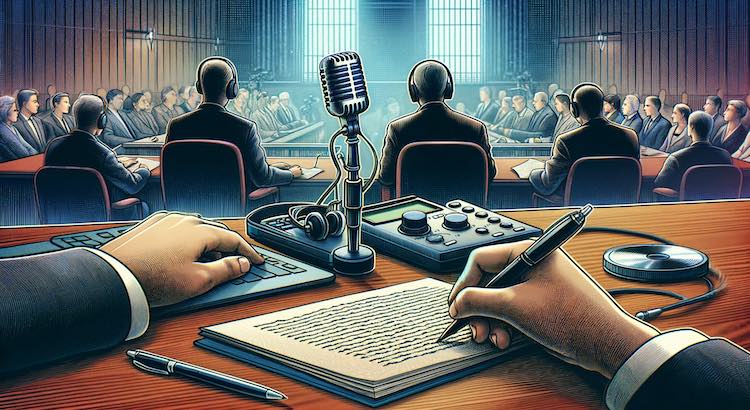The Importance of Accurate Transcriptions in Legal Journalism
Accurate transcriptions are essential for legal journalism. Every word carries weight when reporters cover court cases, legal interviews, or expert opinions. Without precise records, legal stories can mislead audiences or lose credibility.
Why Journalistic Integrity Depends on Accuracy
Journalistic integrity means reporting the truth without error. In legal contexts, accuracy becomes even more critical:
- Misreporting legal details can damage reputations.
- Incorrect quotes may affect case outcomes or public opinion.
- People rely on the news for clarity about legal issues.
Studies show that trust in journalism increases when accuracy is prioritized (Reuters, 2023).
Building Audience Trust Through Accurate Reporting
When journalists use verbatim transcriptions, they show respect for both the subject and the audience. Mistakes can lead to:
- Loss of credibility for the news organization
- Harm to individuals mentioned in legal stories
- Misunderstandings about laws and regulations
The Role of Transcriptions in Legal Proceedings
In courtrooms and legal interviews, words matter. Key reasons transcriptions are indispensable include:
- They document everything said during hearings, trials, and depositions.
- Lawyers, judges, and legal analysts depend on these records for case reviews.
- Journalists use accurate records for fair and balanced reporting.
Even one small error in transcribing legal testimony can lead to significant misunderstandings. Inaccurate reporting from faulty transcriptions may confuse or misinform the public about important legal developments.
How Transcriptions Support Legal Strategies
Verbatim transcription helps legal teams:
- Prepare legal strategies based on facts
- Review past courtroom exchanges for appeals or new arguments
- Avoid disputes over “he-said, she-said” accounts
Reliable transcription services can safeguard against such errors—learn more in-depth through these legal transcription service options.
Precision in Transcribing Legal Interviews
Interviews with lawyers, witnesses, and defendants often reveal new facts. However, misquoting anyone can have major consequences:
- Reputation damage for both the reporter and the source
- Distortion of events in the public record
- Legal challenges if statements are taken out of context
Protecting Interviewee Integrity
Correct transcription ensures:
- Interviewees are represented fairly
- Readers receive factual information
- Media outlets avoid libel issues
According to a 2022 Poynter Institute survey, 42% of journalists said accurate interview transcriptions were key to avoiding misquotes in legal stories.
Technological Advances in Transcription Services
Today’s transcription process is more efficient due to technology. Several new tools are raising standards in the field:
- Automated transcription tools powered by artificial intelligence (AI)
- Machine learning for faster and smarter audio recognition
- Human proofreading for complex legal language
Using automation speeds up transcription, but human experts are still needed for:
- Understanding legal jargon
- Clarifying overlapping voices
- Preserving subtle hints in speech
Benefits of AI Plus Human Expertise
Combining AI with skilled transcribers offers:
- Fast turnaround times
- High accuracy (up to 99%)
- Cost-effective solutions, as shown in transcription pricing comparisons
Compare AI transcription subscriptions to see which model best fits your newsroom’s needs.
Common Challenges and How to Overcome Them
Transcribing legal recordings comes with hurdles. Typical challenges include:
- Poor audio quality or technical issues
- Speakers talking at once
- Complex legal terminology
Effective Solutions for Journalists
Journalists and legal pros should seek transcription providers that:
- Use manual verification for all transcripts
- Employ experts in legal proceedings and terminology
- Offer proofreading services for transcription
- Invest in advanced recording equipment for clarity
Continuous training and up-to-date technology can boost accuracy rates, as highlighted by industry leaders in 2024.
Expanding Access Through Captions and Translation
Besides standard transcription, other services help make legal journalism accessible:
- Closed captioning for broadcasted legal proceedings
- Subtitling for multi-lingual audiences
- Text translation for reports in different languages
- Audio translation for voice recordings
These combined solutions help ensure legal stories reach and serve wider communities.
Conclusion: Get Professional Transcription Help
Accuracy in legal transcription is the backbone of trustworthy legal journalism. Every word matters when stories can shape perceptions and legal outcomes. Choosing reliable transcription, captioning, and translation ensures nothing is lost or misrepresented in transit.
GoTranscript offers proven solutions—including transcription services, advanced AI transcription tools, closed captioning, subtitling, and multi-language translation. You can easily order transcriptions online or request captions to support accurate reporting every time.



















 Verified Order
Verified Order